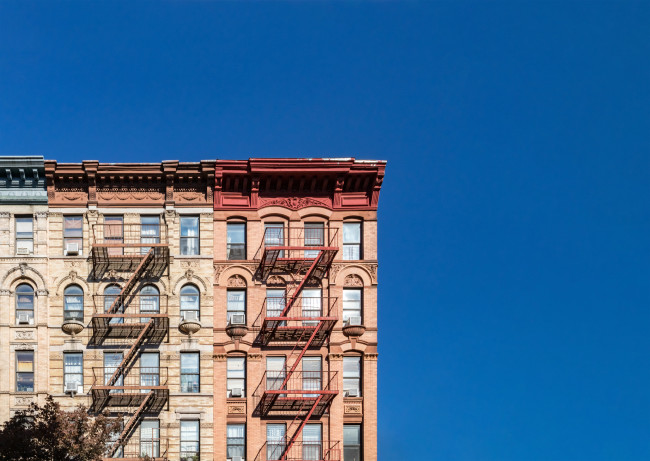Tenants begin using Good Cause eviction law in housing court. Here are the outcomes
- In two cases, tenants successfully applied Good Cause and can remain in their units, for now
- You can use Good Cause to negotiate a lower rent increase—below 8.82 percent this year
- If your landlord won’t negotiate, you have the option of going to court to enforce your rights

To enforce Good Cause, tenants need to head to housing court.
iStock
Market-rate tenants gained landmark protections against rent increases and evictions this year after New York State passed the Good Cause eviction law. But there’s one catch: to enforce their new rights, tenants need to head to housing court.
Now, six months after the law went into effect in April, defense attorneys are using Good Cause eviction to argue their cases.
“In the tenant community, we’re all waiting to see what Good Cause amounts to,” said Jason Blumberg, an attorney with the nonprofit Mobilization for Justice. “The law is only as strong as courts will allow it to be.”
Good Cause eviction does a few things: If your apartment is covered by its protections, your landlord needs to justify evicting you, and they can’t stick you with an “unreasonable” rent increase of above 8.82 percent this year. If they do try to evict you without a “good cause” (such as breaking your lease), or raise your rent above that threshold, you have a right to fight those actions in court.
A tool for negotiation
For tenants, Good Cause is a powerful negotiating tool. Jennifer Rozen, an attorney at the Rozen Law Group, said she’s used the law more than a dozen times to push back against landlords who either declined to renew a tenant’s lease, or tried to raise the rent over the legal threshold. Often a landlord will accept a rent increase below the 8.82 percent threshold instead of heading to housing court, Rozen said.
“I think landlords are getting good advice from their attorneys who are saying, ‘ok, the likelihood of spending a lot of money to go to court, only for the court to say you have to renew this tenant’s lease, it’s just not worth it,’” Rozen said. “I think they’re making business decisions to not litigate so much under Good Cause eviction.”
Why you may decide to settle
But when a landlord won’t negotiate, tenants have to make the weighty decision of whether or not to enforce their rights in housing court. That means hiring an attorney, or trying to secure free representation, and going through what can be a very stressful legal process.
“A lot of tenants don't want to deal with this,” said Dannelly Rodriguez, an attorney at Queens Legal Services. “They might be inclined to settle.”
The law doesn’t guarantee a tenant will win their case: Landlords can provide justifications for rent increases above the 8.82 percent threshold and there are a handful of reasons that would qualify as a “good cause” for not renewing a tenant’s lease, including if you break the law, if your landlord wants to demolish the building, or if the owner wants to live there themselves.
Just three cases, so far, have been decided using Good Cause eviction law in housing court in Queens. Read on to find out how tenants are applying Good Cause to their housing cases, and how to use it in your own negotiations.
‘I was able to breathe’
Jasmin Morales has lived in Queens all her life, but said she wants to move out of her current apartment in the borough—where her landlord is suing to evict her—as soon as possible.
Her landlord, Doc Realty Mgt., served her with a lawsuit for $46,800 in arrears on her $1,800-per-month apartment in May, according to court documents. The judge in her case, Enedina Sanchez, dismissed the lawsuit because the landlord hadn’t notified Morales as to whether or not her apartment was covered by Good Cause during the case, which Sanchez said landlords are required to do after April 20th, when Good Cause went into effect.
The owner’s attorney, Jeanette Malaty, has filed to reargue the case and appeal, arguing that the relevant notification requirement actually kicked in on Aug. 18th, after the case began. (Malaty did not respond to a request for comment.)
As the case makes its way through the court system, Morales, who said she fell behind on rent due to complications with a pregnancy, is grateful Good Cause has at least given her a little extra time to find a new place for herself and her children.
“When [my lawyer] called me that day and said the judge favored us, I was able to breathe that day.” Morales said. “It was a short lived victory, but it definitely felt like a victory.”
Contradictions expected
Morales’ case, however, had a different outcome than another court case decided by Judge Logan Schiff in September. Schiff ruled that Good Cause eviction’s protections apply to cases that were filed after the April 20th effective date, while Sanchez said it applies to cases where a tenant was served with paperwork notifying them that they had been sued after that date.
It’s a small difference, but it’s common for judges to rule differently on similar issues when a law is new, said Andrew Reisman, a staff attorney at the New York Legal Assistance Group who represented Morales in her case against Doc Realty Mgt.
Ultimately, the decision of one judge in housing court isn’t binding for another, said Noah Levenson, an attorney representing the landlord in another case involving Good Cause, 1719 Gates LLC v Torres.
In that case, Schiff ruled that the appropriate way to evict a Good Cause covered tenant was through a nonpayment case, rather than a holdover. That’s significant, because in a nonpayment case, it’s easier for a tenant to bring up problems with the apartment—such as mold, rodent infestations, or a lack of heat—as a defense to not paying their rent, Blumberg said. The decision protects a tenant’s ability to withhold their rent in protest of these conditions, he added.
“The right of a tenant to withhold rent in New York State is sacrosanct,” Blumberg said. “And Judge Schiff in this very important, very thoughtful decision, does a very good job of respecting that.”
Levenson told Brick Underground by email that the owner plans to reargue the case in court and appeal if needed. He noted that the decision is “not binding” for other cases, because it’s just the decision of Queens’ housing court—not the higher court of appeals.
While a judge might “generally consider,” another peer’s decision, they can decide to rule differently, said Alex Jacobs, an attorney at Legal Services NYC who represented the tenant in 1719 Gates LLC v Torres.
Ultimately, that means it will take some time before tenants have clarity on how much protection Good Cause actually provides.
[Editor's note Nov. 8th, 2024: After Levenson's appeal, Schiff reversed his decision on Nov. 7th, stating that a Good Cause-covered tenant can in fact be evicted through a holdover case. Blumberg told Brick Underground via email that the move "ostensibly throw[s] up additional procedural roadblocks to a tenant's ability to successfully withhold rent to force an owner to make repairs."]
What should tenants do?
In the meantime, Jacobs recommends that tenants do their research. Figure out if your building is covered by Good Cause, and take advantage of free legal services—such as Legal Aid, Legal Services NYC, and others—if you need to fight a rent increase or an eviction.
“Dollars to donuts, Good Cause is going to give you protections,” Jacobs said. “It's going to limit how high your rent can go each renewal lease. I wish it went further. I wish it did more. But, what a massive increase in security that people have now that they didn’t have yesterday.”
You Might Also Like































